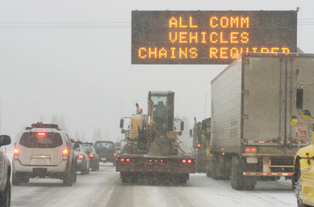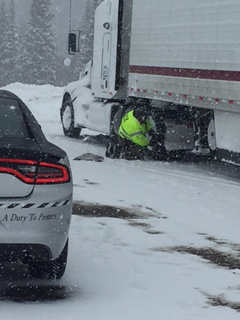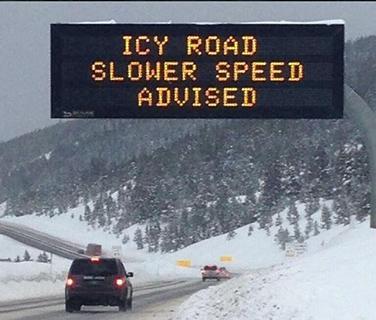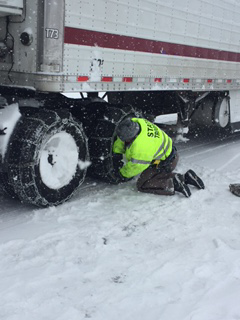Chain Law Information
Colorado's Chain Law
Winter driving conditions can be expected in the Colorado high country as early as September and as late as May. Travelers must be prepared to drive safely at all times and in all conditions. View the winter driving guide to help you safely navigate our beautiful mountain roads during these winter months.
Colorado's Chain Law is not just for Large Commercial Vehicles. All vehicles need to be prepared to have adequate tires and equipment when traveling in Colorado during the winter. Chain Law and safe tire requirements can be put into effect at any time for all types of vehicles. These requirements have recently changed.

Larger Vehicles, Including Recreational and Commercial Motor Vehicles
As of August 7, 2024, all commercial motor vehicle drivers must carry chains from September 1 to May 31. This applies to vehicles with a combined weight of more than 16,000 lbs used in commerce or as transport for at least 16 passengers (including the driver) on public highways. View the Colorado chain up tips (consejos para colocar cadenas en Colorado) handout for more information on what must be carried by CMVs.
Commercial vehicles and buses have a larger footprint on roadways where chains are required. CMVs must carry chains or ATDs on all the following roads regardless of current weather:
- I-70 west of milepost 259 (Morrison) to the Utah border.
- Colorado Highway 9 mile post 63 to milepost 97 (Frisco to Fairplay).
- Route 40 milepost 256 (Empire) to the Utah border.
- U.S. Route 50 milepost 225 (Salida) to the Utah border.
- U.S. Route 160 milepost 304 (Walsenburg) to the New Mexico border.
- U.S. Route 285 milepost 250 (Morrison) to the New Mexico border.
- All of U.S Route 550.
Those required to chain 4 drive tires:
- Straight Trucks: 4 tire chains, 4 AutoSocks, 4 tire cables 0.415 diameters or greater, auto chains, or sanders.
- Single Drive Axle Combinations: 4 tire chains, 4 AutoSocks, auto chains, or sanders. No cables are allowed.
- Tandem Drive Axle Combinations: 4 tire chains, 4 AutoSocks, tire cables 0.415 inches in diameter or greater, auto chains, or sanders. Tire cables are permitted only if the outer tires on both ends of one drive axle are equipped with tire chains, and at least four traction devices are used in total.
- Auto Transporters: 4 tire chains, 4 AutoSocks, 4 tire cables 0.415 or greater, auto chains, or sanders. Do not use chains if use places hydraulic lines at risk of damage (alternative traction devices (ATDs) may be used to mitigate the risk). Travel will be restricted if the vehicle is unable to chain.
Those required to chain 2 drive tires:
- Buses: 2 tire chains, 2 tire cables 0.415 diameters or greater, 2 AutoSocks, auto chains, or sanders.
- Hot shot trucking: Traditional motor vehicles (such as pickup trucks) that are pulling trailers and meet the above-listed weight criteria must also carry chains. 2 tire chains for singles (to affix to rear tires). Exception: Duallies need 4 tire chains.
For more safe driving tips, visit Truck Safety Campaign-The Mountain Rules.
Smaller Vehicles, Including Passenger Cars and Trucks with Two-Wheel and Four-Wheel Drive
All motor vehicles with a GCWR/GVWR of less than 16,001 pounds traveling on any portion of I-70 between Dotsero (MP 133) and Morrison (MP 259) from September 1 through May 31 must comply with the Passenger Vehicle Traction Law when it is active.
The requirements differ based on the type of drivetrain:
Under SB25-069, 2WD vehicles must carry tire chains or an approved alternate traction device (ATD) from September 1–May 31, regardless of which tires they have. When the Passenger Vehicle Traction Law is in effect, 2WD vehicles must have one of the following:
- Tire chains installed on two or more drive tires; or
- An approved ATD installed on two or more drive tires.
Important:
- Upgrading to M+S, all-season, or mountain-snowflake tires does not bring a 2WD vehicle into compliance.
- There is no tire-only option for 2WD under the updated law.
- Chains/ATDs must be physically affixed to the tires when CDOT activates the overhead signs indicating the law is in effect.
4WD and AWD vehicles may comply using specific winter tires or by using chains/ATDs.
When the Passenger Vehicle Traction Law is in effect, 4WD/AWD vehicles must have one of the following:
- Tire chains for two or more drive tires; or
- An approved ATD for two or more drive tires; or
- Tires with at least 3/16 inch of tread depth that are rated by the manufacturer as:
- Mountain-snowflake (3PMSF); or
- M&S / M+S / M/S; or
- All-weather
4WD/AWD vehicles can comply with winter-rated tires alone if the tires meet the 3/16-inch tread requirement and the appropriate manufacturer rating. Chains/ATDs are still recommended during severe storms.
The passenger traction law requires two-wheel drive passenger vehicles to affix chains or alternate traction devices (ATDs). Vehicles with four-wheel drive or all-wheel drive must have all-weather or Mountain-Snowflake, "M&S", "M=S", or "M/S" tires with adequate tread or be equipped with tire chains or alternate traction devices (ATDs).
The Passenger Vehicle Chain Law imposes the most restrictive requirements during inclement weather. All passenger vehicles must have chains or alternate traction devices (ATDs) on two or more drive tires. This applies to every two/four/all-wheel drive passenger vehicle in the affected area.
The Commercial Motor Vehicle Chain Law is a requirement for all large vehicles to affix chains or alternate traction devices (ATDs) to all drive tires (up to four). Even though it has "commercial" in the name, the requirement is based on the Gross Vehicle Weight Rating (GVWR) or Gross Combined Weight Rating (GCWR) for the vehicle regardless of its use (private or commercial).
Penalty for non-compliance with winter driving restrictions: Up to a $500 fine plus a $79 surcharge or, if you are stuck and blocking any traveled portion of the roadway the fine is $1,000 plus a $157 surcharge.
How will the different chain law restrictions be announced?
At a minimum, the Colorado Department of Transportation (CDOT) will notify the public of the travel restriction with erected static and electronic variable message roadway signs. Additionally, CDOT may utilize radio channels, the official CDOT travel website (cotrip.org), phone message system, email, text and other automated personal notification systems.


